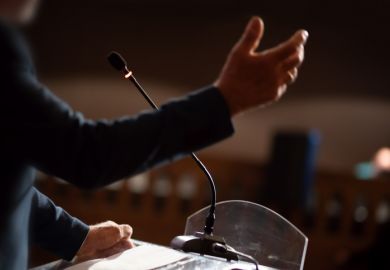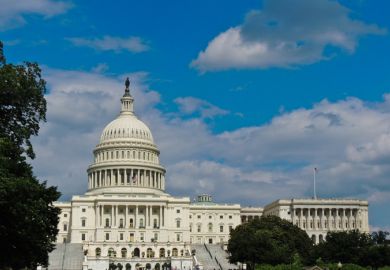On 20 November 2024, Donald Trump nominated Linda McMahon as his education secretary. The day after, I was teaching a class, as a visiting Fulbright scholar, at Rutgers, the State University of New Jersey, in Newark, about the links between housing policy and institutional racism. I was left wondering if such a thing will still be possible after Trump and McMahon take office today.
McMahon made her fortune and reputation through the TV company World Wrestling Entertainment. She has very little educational experience and appears to have lied about holding an education degree. But the bigger concern is that she and the new administration will take the US backwards, to an education system that marginalises, or even prohibits, the kind of inclusive, challenging, non-traditional academic syllabus I taught at Rutgers.
I’m what they call in the US a “first-gen scholar” – and a late-blooming one at that. I completed a PhD in my 50th year, in 2013, and I only became a lecturer in 2022. Prior to that I had a 30-year career in the UK’s housing sector (including active involvement in housing campaigns), culminating in a decade managing a council estate in the wildly unequal London borough of Islington. All this made it easier for me to connect with the Rutgers students.
During my semester there – a secondment from my day job at London Metropolitan University – I was attached to the Honors Living Learning Community (HLLC), a unique student and teaching experience. Classes were delivered in the same purpose-built facility in downtown Newark where most of the students – and I – lived. This created a very intimate learning environment. At times, it felt a bit intense, but it also fostered the development of personal relationships and mutual support. I sometimes wondered if HLLC was akin to the Oxbridge college model, albeit in a very different context.
I co-led a course called “Local Citizenship in a Global World”, focusing on social justice – particularly housing equity, mass incarceration and reparations for slavery. From a UK perspective, it was very refreshing to have the latitude to explore fundamental issues like freedom, democracy and identity, and our class of 80 – majoring in a range of subjects, from business to political science – responded in kind.
They were mostly young people of colour from local, working-class communities. Some had difficult backgrounds. Some were first-generation immigrants. But they threw themselves into HLLC’s ethos of active participation, inside and outside the university, expressing themselves not only in essays but also in poetry, music, visual art and hip hop.
HLLC’s aim is to produce “change agents”: people who will contribute to challenging educational and socio-economic inequality. A key component is addressing structural racism, particularly in “majority minority” communities like Newark. But Trump’s election victory, on the back of his anti-“woke”, anti-DEI message, makes me worry about what comes next.
Most of the students (average age approximately 20) were adamantly opposed to Trump, and some strongly encouraged others to vote Democrat. However, it wasn’t clear from our discussions how many actually did. Throughout the semester, students repeatedly referred to a two-party political system that is failing and alienating people like them, and a significant number seemed unconvinced that Kamala Harris represented a real alternative worth voting for.
Still, the students’ shock, dismay and fear at Trump’s victory was palpable. Some may be worried their families and friends will be the targets of his promised “mass deportations”. Others, that the racist rhetoric he so often uses will expose them to even more of the discrimination they refer to as a constant feature of their lives.
How to spark social justice awareness in the classroom
It’s not that McMahon will be able to immediately abolish places like HLLC. Institutions like Rutgers have enough power of their own to withstand a degree of interference from the federal government. The more worrying possibility is that the Trump administration will foster a climate of intimidation around studying and debating some of the issues HLLC tackles.
Trump comes to power during the 100th anniversary year of the Scopes Trial, a high-profile test case concerning Tennessee’s ban on the teaching of evolution. It is not far-fetched to anticipate the restrictions on teaching topics such as critical race theory already seen in some states, including the banning of books, moving to other parts of the country during the new Trump era.
As I shared with my HLLC class, there is another precedent for this. Most of them had never heard of McCarthyism or its destructive impact on millions of Americans, including many academics and teachers. But there have been reports of groups sympathetic to Trump drawing up lists of progressive public servants seen as “uncooperative”. And when he talks about “the enemy within”, the warning is very clear.
It’s easy to fall into despondency. But my abiding experience of HLLC was of an inspirational generation determined to forge a better future for America and the world. The force of the Black Lives Matter movement may have dissipated, but it is deeply embedded in their political consciousness, whatever their ethnicity. They fully recognise an attempt to return to a time of passive acceptance of social injustice, and they will resist it.
As Maya Angelou said: “We must create a climate where people agree that human beings are more alike than unalike. The only way to do that is through education.” This message of unity and equality is the opposite of what Trump stands for, but it is the essence of HLLC. The need for more places like it is more apparent than ever on a day like today.
Glyn Robbins is a senior lecturer in community development and leadership at London Metropolitan University.
Register to continue
Why register?
- Registration is free and only takes a moment
- Once registered, you can read 3 articles a month
- Sign up for our newsletter
Subscribe
Or subscribe for unlimited access to:
- Unlimited access to news, views, insights & reviews
- Digital editions
- Digital access to THE’s university and college rankings analysis
Already registered or a current subscriber?








